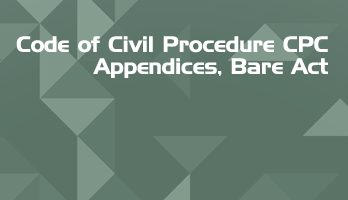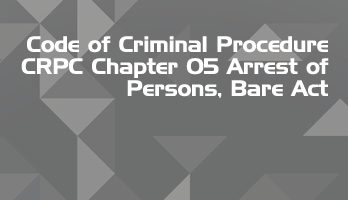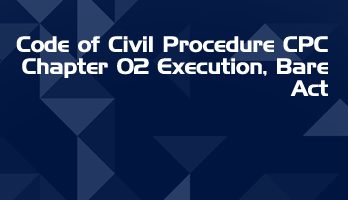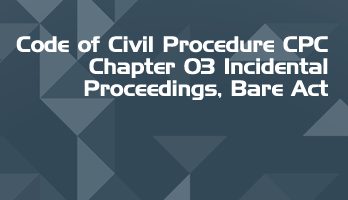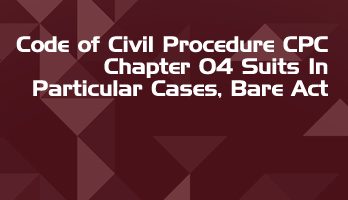A 'Bare act' is the actual legislation passed by the Parliament of India. Generally, an act sets out the high level legal and policy principles applicable to the subject matter of the law.
Most acts are accompanied by 'subsidiary legislation' such as rules, regulations, notifications and orders; which address the actual implementation detail of the act.
Free Full Course Available on LawMint's YouTube Channel
How to Land Your Dream LLB Internship in a Top Law Firm
- Part 1 - Introduction
- Part 2 - Internship Planning
- Part 3 - Internship Research
- Part 4 - Building Your Profile
- Part 5 - The Email
- Part 6 - The Resume
- Part 7 - The Cover Letter
- Part 8 - The Interview
- Part 9 - Self Development
Practical and comprehensive course, with real examples and step-by-step analysis of the complete internship application process. Check out LawMint's YouTube channel now!
Indian Penal Code, 1860
Chapter IV – General Exceptions
Section 76 – Act done by a person bound, or by mistake of fact believing himself bound, by law
Nothing is an offence which is done by a person who is, or who by reason of a mistake of fact and not by reason of a mistake of law in good faith believes himself to be, bound by law to do it.
Illustrations
- A, a soldier, fires on a mob by the order of his superior officer, in conformity with the commands of the law. A has committed no offence.
- A, an officer of a Court of Justice, being ordered by that Court to arrest Y, and after due enquiry, believing Z to be Y, arrests Z. A has committed no offence.
Section 77 – Act of Judge when acting judicially
Nothing is an offence which is done by a Judge when acting judicially in the exercise of any power which is, or which in good faith he believes to be, given to him by law.
Section 78 – Act done pursuant to the judgment or order of Court
Nothing which is done in pursuance of, or which is warranted by the judgment or order of, a Court of Justice, if done whilst such judgment or order remains in force, is an offence, notwithstanding the Court may have had no jurisdiction to pass such judgment or order, provided the person doing the act in good faith believes that the Court had such jurisdiction.
Section 79 – Act done by a person justified, or by mistake of fact believing himself, justified, by law
Nothing is an offence which is done by any person who is justified by law, or who by reason of a mistake of fact and not by reason of a mistake of law in good faith, believes himself to be justified by law, in doing it.
Illustrations
- A sees Z commit what appears to A to be a murder. A, in the exercise, to the best of his judgment exerted in good faith, of the power which the law gives to all persons of apprehending murderers in the fact, seizes Z, in order to bring Z before the proper authorities. A has committed no offence, though it may turn out that Z was acting in self – defence.
Section 80 – Accident in doing a lawful act
Nothing is an offence which is done by accident or misfortune, and without any criminal intention or knowledge in the doing of a lawful act in a lawful manner by lawful means and with proper care and caution.
Illustrations
- A is at work with a hatchet; the head flies off and kills a man who is standing by. Here, if there was no want of proper caution on the part of A, his act is excusable and not an offence.
Section 81 – Act likely to cause harm, but done without criminal intent, and to prevent other harm
Nothing is an offence merely by reason of its being done with the knowledge that it is likely to cause harm, if it be done without any criminal intention to cause harm, and in good faith for the purpose of preventing or avoiding other harm to person or property.
Explanations
- It is a question of fact in such a case whether the harm to be prevented or avoided was of such a nature and so imminent as to justify or excuse the risk of doing the act with the knowledge that it was likely to cause harm.
Illustrations
- A, the captain of a steam vessel, suddenly and without any fault or negligence on his part, finds himself in such a position that, before he can stop his vessel, he must inevitably run down a boat B, with twenty or thirty passengers on board, unless he changes the course of his vessel, and that, by changing his course, he must incur risk of running down a boat C with only two passengers on board, which he may possibly clear. Here, if A alters his course without any intention to run down the boat C and in good faith for the purpose of avoiding the danger to the passengers in the boat B, he is not guilty of an offence, though he may run down the boat C by doing an which he knew was likely to cause that effect, if it be found as a matter of fact that the danger which he intended to avoid was such as to excuse him in incurring the risk of running down C.
- A, in a great fire, pulls down houses in order to prevent the conflagration from spreading. He does this with the intention in good faith of saving human life or property. Here, if it be found that the harm to be prevented was of such a nature and so imminent as to excuse A – s act, A is not guilty of the offence.
Section 82 – Act of a child under seven years of age
Nothing is an offence which is done by a child under seven years of age.
Section 83 – Act of a child above seven and under twelve of immature understanding
Nothing is an offence which is done by a child above seven years of age and under twelve, who has not attained sufficient maturity of understanding to judge of the nature and consequences of his conduct on that occasion.
Section 84 – Act of a person of unsound mind
Nothing is an offence which is done by a person who, at the time of doing it, by reason of unsoundness of mind, is incapable of knowing the nature of the act, or that he is doing what is either wrong or contrary to law.
Section 85 – Act of a person incapable of judgment by reason of intoxication caused against his will
Nothing is an offence which is done by a person who, at the time of doing it, is, by reason of intoxication, incapable of knowing the nature of the act, or that he is doing what is either wrong, or contrary to law: provided that the thing which intoxicated him was administered to him without his knowledge or against his will.
Section 86 – Offence requiring a particular intent or knowledge committed by one who is intoxicated
In cases where an act done is not an offence unless done with a particular knowledge or intent, a person who does the act in a state of intoxication shall be liable to be dealt with as if he had the same knowledge as he would have had if he had not been intoxicated, unless the thing which intoxicated him was administered to him without his knowledge or against his will.
Section 87 – Act not intended and not known to be likely to cause death or grievous hurt, done by consent
Nothing which is not intended to cause death, or grievous hurt, and which is not known by the doer to be likely to cause death or grievous hurt, is an offence by reason of any harm which it may cause, or be intended by the doer to cause, to any person, above eighteen years of age, who has given consent, whether express or implied, to suffer that harm; or by reason of any harm which it may be known by the doer to be likely to cause to any such person who has consented to take the risk of that harm.
Illustrations
- A and Z agree to fence with each other for amusement. This agreement implies the consent of each to suffer any harm which, in the course of such fencing, may be caused without foul play; and if A, while playing fairly, hurts Z, A commits no offence.
Section 88 – Act not intended to cause death, done by consent in good faith for person – s benefit
Nothing, which is not intended to cause death, is an offence by reason of any harm which it may cause, or be intended by the doer to cause, or be known by the doer to be likely to cause, to any person for whose benefit it is done in good faith, and who has given a consent, whether express or implied to suffer that harm, or to take the risk of that harm.
Illustrations
- A, a surgeon, knowing that a particular operation is likely to cause the death of Z, who suffers under the painful complaint, but not intending to cause Z – s death, and intending, in good faith, Z – s benefit, performs that operation on Z, with Z – s consent. A has committed no offence.
Section 89 – Act done in good faith for benefit of child or insane person, by or by consent of guardian
Nothing which is done in good faith for the benefit of a person under twelve years of age, or of unsound mind, by or by consent, either express or implied, of the guardian or other person having lawful charge of that person, is an offence by reason of any harm which it may cause, or be intended by the doer to cause or be known by the doer to be likely to cause to that person: Provided
Provisos
- That this exception shall not extend to the intentional causing of death, or to the attempting to cause death;
- That this exception shall not extend to the doing of anything which the person doing it knows to be likely to cause death, for any purpose other than the preventing of death or grievous hurt, or the curing of any grievous disease or infirmity;
- That this exception shall not extend to the voluntary causing of grievous hurt, or to the attempting to cause grievous hurt, unless it be for the purpose of preventing death or grievous hurt, or the curing of any grievous disease or infirmity;
- That this exception shall not extend to the abetment of any offence, to the committing of which offence it would not extend.
Illustrations
- A, in good faith, for his child – s benefit without his child – s consent, has his child cut for the stone by a surgeon knowing it to be likely that the operation will cause the child – s death, but not intending to cause the child – s death. A is within the exception, in as much as his object was the cure of the child.
Section 90 – Consent known to be given under fear or misconception
A consent is not such a consent as is intended by any section of this Code, if the consent is given by a person under fear of injury, or under a misconception of fact, and if the person doing the act knows, or has reason to believe, that the consent was given in consequence of such fear or misconception; or
Consent of insane person if the consent is given by a person who, from unsoundness of mind, or intoxication, is unable to understand the nature and consequence of that to which he gives his consent; or
Consent of child unless the contrary appears from the context, if the consent is given by a person who is under twelve years of age
Section 91 – Exclusion of acts which are offences independently of harm cause
The exceptions in sections 87, 88 and 89 do not extend to acts which are offences independently of any harm which they may cause, or be intended to cause, or be known to be likely to cause, to the person giving the consent, or on whose behalf the consent is given.
Illustrations
- Causing miscarriage (unless caused in good faith for the purpose of saving the life of the woman) is offence inexpediently of any harm which it may cause or be intended to cause to the woman. Therefore, it is not an offence – by reason of such harm – ; and the consent of the woman or of her guardian to the causing of such miscarriage does not justify the act.
Section 92 – Act done in good faith for benefit of a person without consent
Nothing is an offence by reason of any harm which it may causes to a person for whose benefit it is done in good faith, even without that person – s consent, if the circumstances are such that it is impossible for that person to signify consent, or if that person is incapable of giving consent, and has no guardian or other person in lawful charge of him from whom it is possible to obtain consent in time for the thing to be done with benefit: Provided – Provisos.
Provisos
- That this exception shall not extend to the intentional causing of death or the attempting to cause death;
- That this exception shall not extend to the doing of anything which the person doing it knows to be likely to cause death, for any purpose other than the preventing of death or grievous hurt, or the curing of any grievous disease or infirmity;
- That this exception shall not extend to the voluntary causing of hurt, or to the attempting to cause hurt, for any purpose other than the preventing of death or hurt;
- That this exception shall not extend to the abetment of any offence, to the committing of which offence it would not extend.
Illustrations
- Z is thrown from his horse, and is insensible. A, a surgeon, finds that Z requires to be trepanned. A, not intending Z – s death, but in good faith, for Z – s benefit, performs the trepan before Z recovers his power of judging for himself. A has committed no offence.
- Z is carried off by a tiger. A fires at the tiger knowing it to be likely that the shot may kill Z, but not intending to kill Z, and in good faith intending Z – s benefit. A – s ball gives Z a mortal wound. A has committed no offence.
- A, a surgeon, sees a child suffer an accident which is likely to prove fatal unless an operation be immediately performed. There is not time to apply to the child – s guardian. A performs the operation in spite of the entreaties of the child, intending, in good faith, the child – s benefit. A has committed no offence.
- A is in a house which is on fire, with Z, a child. People below hold out a blanket. A drops the child, from the house – top, knowing it to be likely that the fall may kill the child, but not intending to kill the child, and intending, in good faith, the child – s benefit. Here, even if the child is killed by the fall, A has committed no offence.
Explanations
- Mere pecuniary benefit is not benefit within the meaning of sections 88 89 and 92.
Section 93 – Communication made in good faith
No communication made in good faith is an offence by reason of any harm to the person to whom it is made, if it is made for the benefit of that person.
Illustrations
- A, a surgeon, in good faith, communicates to a patient his opinion that he cannot live. The patient dies in consequence of the shock. A has committed no offence, though he knew it to be likely that the communication might cause the patient – s death.
Section 94 – Act to which a person is compelled by threats
Except murder, and offences against the State punishable with death, nothing is an offence which is done by a person who is compelled to do it by threats, which, at the time of doing it, reasonably cause the apprehension that instant death to that person will otherwise be the consequence: Provided the person doing the act did not of his own accord, or from a reasonable apprehension of harm to himself short of instant death, place himself in the situation by which he became subject to such constraint.
Explanations
- A person who, of his own accord, or by reason of a threat of being beaten, joins a gang of dacoits, knowing their character, is not entitled to the benefit of this exception, on the ground of his having been compelled by his associates to do anything that is an offence by law.
- A person seized by a gang of dacoits, and forced, by threat of instant death, to do a thing which is an offence by law; for example, a smith compelled to take his tools and to force the door of a house for the dacoits to enter and plunder it, is entitled to the benefit of this exception.
Section 95 – Act causing slight harm
Nothing is an offence by reason that it causes, or that it is intended to cause, or that it is known to be likely to cause, any harm, if that harm is so slight that no person of ordinary sense and temper would complain of such harm.
Section 96 – Things done in private defence
Nothing is an offence which is done in the exercise of the right of private defence.
Section 97 – Right of private defence of the body and of property
Every person has a right, subject to the restrictions contained in section 99, to defend –
- His own body, and the body of any other person, against any offence affecting the human body;
- The property, whether movable or immovable, of himself or of any other person, against any act which is an offence falling under the definition of theft, robbery, mischief or criminal trespass, or which is an attempt to commit theft, robbery, mischief or criminal trespass.
Section 98 – Right of private defence against the act of a person of unsound mind, etc.
When an act which would otherwise be a certain offence, is not that offence, by reason of the youth, the want of maturity of understanding, the unsoundness of mind or the intoxication of the person doing that act, or by reason of any misconception on the part of that person, every person has the same right of private defence against that act which he would have if the act were that offence.
Illustrations
- Z, under the influence of madness, attempts to kill A; Z is guilty of no offence. But A has the same right of private defence which he would have if Z were sane.
- A enters by night a house which he is legally entitled to enter. Z, in good faith, taking A for a house – breaker, attacks A. Here Z, by attacking A under this misconception, commits no offence. But A has the same right of private defence against Z, which he would have if Z were not acting under that misconception.
Section 99 – Acts against which there is no right of private defence
There is no right of private defence against an act which does not reasonably cause the apprehension of death or of grievous hurt, if done, or attempted to be done, by a public servant acting in good faith under colour of his office, though that act may not be strictly justifiable by law.
There is no right of private defence against an act which does not reasonably cause the apprehension of death or of grievous hurt, if done, or attempted to be done, by the direction of a public servant acting in good faith under colour of his office though that direction may not be strictly justifiable by law.
There is no right of private defence in cases in which there is time to have recourse to protection of the public authorities.
Extent to which the right may be exercised – The right of private defence in no case extends to the inflicting of more harm than it is necessary to inflict for the purpose of defence.
Explanations
- A person is not deprived of the right of private defence against an act done, or attempted to be done, by a public servant, as such, unless he knows or has reason to believe, that the person doing the act is such public servant.
- A person is not deprived of the right of private defence against an act done, or attempted to be done, by the direction of a public servant, unless he knows, or has reason to believe, that the person doing the act is acting by such direction, or unless such person states the authority under which he acts, or if he has authority in writing, unless he produces such authority, if demanded.
Section 100 – When the right of private defence of the body extends to causing death
The right of private defence of the body extends, under the restrictions mentioned in the last preceding section, to the voluntary causing of death or of any other harm to the assailant, if the offence which occasions the exercise of the right be of any of the descriptions hereinafter enumerated, namely:
- Such an assault as may reasonably cause the apprehension that death will otherwise be the consequence of such assault;
- Such an assault as may reasonably cause the apprehension that grievous hurt will otherwise be the consequence of such assault;
- An assault with the intention of committing rape;
- An assault with the intention of gratifying unnatural lust;
- An assault with the intention of kidnapping or abducting;
- An assault with the intention of wrongfully confining a person, under circumstances which may reasonably cause him to apprehend that he will be unable to have recourse to the public authorities for his release.
- An act of throwing or administering acid or an attempt to throw or administer acid which may reasonably cause the apprehension that grievous hurt will otherwise be the consequence of such act.
1 Criminal Law (Amendment) Act, 2013
Section 101 – When such right extends to causing any harm other than death
If the offence be not of any of the descriptions enumerated in the last preceding section, the right of private defence of the body does not extend to the voluntary causing of death to the assailant, but does extend, under the restrictions mentioned in section 99, to the voluntary causing to the assailant of any harm other than death.
Section 102 – Commencement and continuance of the right of private defence of the body
The right of private defence of the body commences as soon as a reasonable apprehension of danger to the body arises from an attempt or threat to commit the offence though the offence may not have been committed; and it continues as long as such apprehension of danger to the body continues.
Section 103 – When the right of private defence of property extends to causing death
The right of private defence of property extends, under the restrictions mentioned in section 99, to the voluntary causing of death or of any other harm to the wrong – doer, if the offence, the committing of which, or the attempting to commit which, occasions the exercise of the right, be an offence of any of the descriptions hereinafter enumerated, namely:
- Robbery;
- House – breaking by night;
- Mischief by fire committed on any building, tent or vessel, which building, tent or vessel is used as a human dwelling, or as a place for the custody of property;
- Theft, mischief, or house – trespass, under such circumstances as may reasonably cause apprehension that death or grievous hurt will be the consequence, if such right of private defence is not exercised.
Section 104 – When such right to causing any harm other than death
If the offence, the committing of which, or the attempting to commit which occasions the exercise of the right of private defence, be theft, mischief, or criminal trespass, not of any of the descriptions enumerated in the last preceding section, that right does not extend to the voluntary causing of death, but does extend, subject to the restrictions mentioned in section 99, to the voluntary causing to the wrong – doer of any harm other than death.
Section 105 – Commencement and continuance of the right of private defence of property
The right of private defence of property commences when a reasonable apprehension of danger to the property commences. The right of private defence of property against theft continues till the offender has effected his retreat with the property or either the assistance of the public authorities is obtained, or the property has been recovered.
The right of private defence of property against robbery continues as long as the offender causes or attempts to cause to any person death or hurt or wrongful restraint or as long as the fear of instant death or of instant hurt or of instant personal restraint continues.
The right of private defence of property against criminal trespass or mischief continues as long as the offender continues in the commission of criminal trespass or mischief.
The right of private defence of property against house – breaking by night continues as long as the house – trespass which has been begun by such house – breaking continues.
Section 106 – Right of private defence against deadly assault when there is risk of harm to innocent person
If in the exercise of the right of private defence against an assault which reasonably causes the apprehension of death, the defender be so situated that he cannot effectually exercise that right without risk of harm to an innocent person, his right of private defence extends to the running of that risk.
Illustrations
- A is attacked by a mob who attempt to murder him. He cannot effectually exercise his right of private defence without firing on the mob, and he cannot fire without risk of harming young children who are mingled with the mob. A commits no offence if by so firing he harms any of the children.
Important Central Acts in Regional Languages
Legislative department website also features regional language versions of several important Central Acts.
Free Full Course Available on LawMint's YouTube Channel
How to Land Your Dream LLB Internship in a Top Law Firm
- Part 1 - Introduction
- Part 2 - Internship Planning
- Part 3 - Internship Research
- Part 4 - Building Your Profile
- Part 5 - The Email
- Part 6 - The Resume
- Part 7 - The Cover Letter
- Part 8 - The Interview
- Part 9 - Self Development
Practical and comprehensive course, with real examples and step-by-step analysis of the complete internship application process. Check out LawMint's YouTube channel now!





